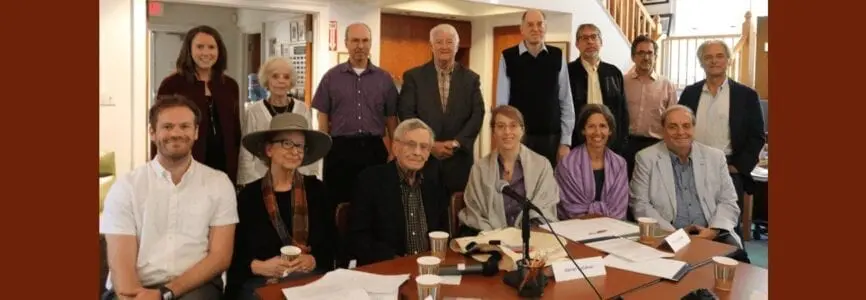Hastings Center News
How Can Bioethics Help Mitigate Climate Change? Hastings Center Explores Options
Climate change has been called the greatest challenge humanity has ever faced. It is already affecting human health in the form of a decline in air quality and an increase in disease-causing insects such as ticks and mosquitoes. How might bioethics help address the threats posed by climate change?
Daniel Callahan, cofounder and President Emeritus of The Hastings Center, convened a meeting at the Center on June 3 and 4 to explore this question. The meeting brought together experts on climate change, political scientists, bioethicists, directors of university programs on health and climate change, and teachers of courses on climate change. The aim was to take an inventory of present research and education efforts, forge bonds between programs in health and climate science, and consider next steps for research and policy.
Callahan noted that climate change and bioethics both arose from the human quest for progress. Just as medical progress has led to improved medical care and increased life expectancy, it has also raised ethical dilemmas, for example, concerning decision-making at the end of life and the affordability of medicine. Similarly, progress more generally has given rise to increased fossil fuel consumption, which has caused climate change.
“Both global warming mitigation and health improvements share some similar ethical problems and dilemmas,” said Callahan at the meeting. One of them is to find a good balance between cultural change and technological solutions. For health care, there is a tension between preventive medicine and high-tech care. In the case of global warming the tension is between changing climate-affecting behavior, such as burning down forests, and technological and economic solutions, such as solar panels and windmills.
“While both ways are being pursued, the technological routes are socially attractive,” he continued. “They do not require behavior changes of any magnitude, and even better they are economically attractive. There is good money to be made on solar panels and wind machines. The seduction here is that the greater ease of technological solutions for global warming may minimize difficult cultural change.”
In her remarks at the meeting, Mildred Solomon, president of The Hastings Center, noted that “a through line across nearly all Hastings projects, over its 50-year history, has been a desire to consider what the right relationship ought to be between humans and nature. Where do we draw the line between our inventiveness and our desire to use nature for our own ends versus the awe and respect we should accord the natural world through stewardship and preservation? When does our desire to innovate become exploitation? This tension must be managed in nearly every context The Hastings Center explores — whether the question is about changing the human genome, pursuing a radically extended human lifespan, or producing energy through extraction of natural resources like oil and coal.”

